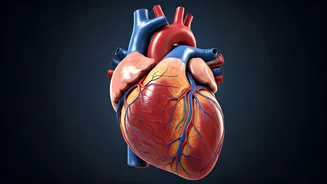The Silent Threat
High cholesterol often presents as a silent threat, with no noticeable symptoms until a critical event occurs. A case in point is the experience of an
IT professional who disregarded borderline cholesterol levels at the age of 25. This individual, like many others, may not have understood the significance of this early warning sign. Fast forward a decade, and the consequences became painfully clear: a heart attack at the age of 35. This stark reality underscores a significant lesson: even seemingly minor cholesterol elevations should not be dismissed. Early detection and active management are critical. Regular check-ups and a proactive approach to health can help in preventing severe outcomes, as this person might have avoided through early intervention.
Understanding LDL
LDL cholesterol, often dubbed the 'bad' cholesterol, plays a pivotal role in heart health. When LDL levels rise excessively, it gradually accumulates within the arteries, forming plaque. This plaque accumulation narrows the arteries, a condition known as atherosclerosis, which restricts blood flow. This restricted blood flow to the heart is a primary cause of heart disease. Understanding how LDL impacts the cardiovascular system is crucial. Maintaining optimal LDL levels involves adopting a healthy lifestyle, which includes a balanced diet, regular physical activity, and, if necessary, medication. Taking proactive steps to manage LDL cholesterol is paramount to minimizing the risk of heart attacks and strokes.
Early Detection Matters
The importance of early detection cannot be overemphasized. Regular health check-ups, including blood tests to assess cholesterol levels, are crucial. These tests provide valuable insights into the state of one's cardiovascular health. If elevated cholesterol is detected, a healthcare provider can advise on necessary lifestyle changes or medical interventions. Early detection allows for timely intervention, which is far more effective than treating a full-blown cardiac event. The goal is to catch any issues early on and prevent the progression of the disease. This proactive approach significantly reduces the risk of heart-related complications, leading to a healthier life. It underscores the wisdom of being attentive to one's body and actively seeking medical advice if anything seems out of place.
Lifestyle Modifications
Lifestyle changes are a cornerstone of managing cholesterol levels. A heart-healthy diet is critical, emphasizing fruits, vegetables, whole grains, and lean proteins, while limiting saturated and trans fats. Regular physical activity also plays a pivotal role. Aim for at least 150 minutes of moderate-intensity exercise or 75 minutes of vigorous-intensity exercise each week. Another key factor is smoking cessation. Smoking damages blood vessels, exacerbating the negative effects of high cholesterol. Moreover, managing stress is also essential, as chronic stress can indirectly impact cardiovascular health. These lifestyle adjustments, when implemented consistently, can help lower LDL cholesterol and improve overall health.
Seeking Professional Guidance
Consulting healthcare professionals is crucial for effectively managing cholesterol. Doctors can evaluate individual risk factors and recommend the most appropriate course of action. They can assess the overall cardiovascular health and advise on the need for medication. For instance, statins are commonly prescribed to lower LDL cholesterol. Doctors will also monitor your health regularly and modify treatments as needed. Following professional guidance ensures personalized and effective cholesterol management, enabling individuals to reduce their risk of heart disease and maintain a healthy lifestyle. Never self-medicate; always seek the advice of a trained medical professional.













